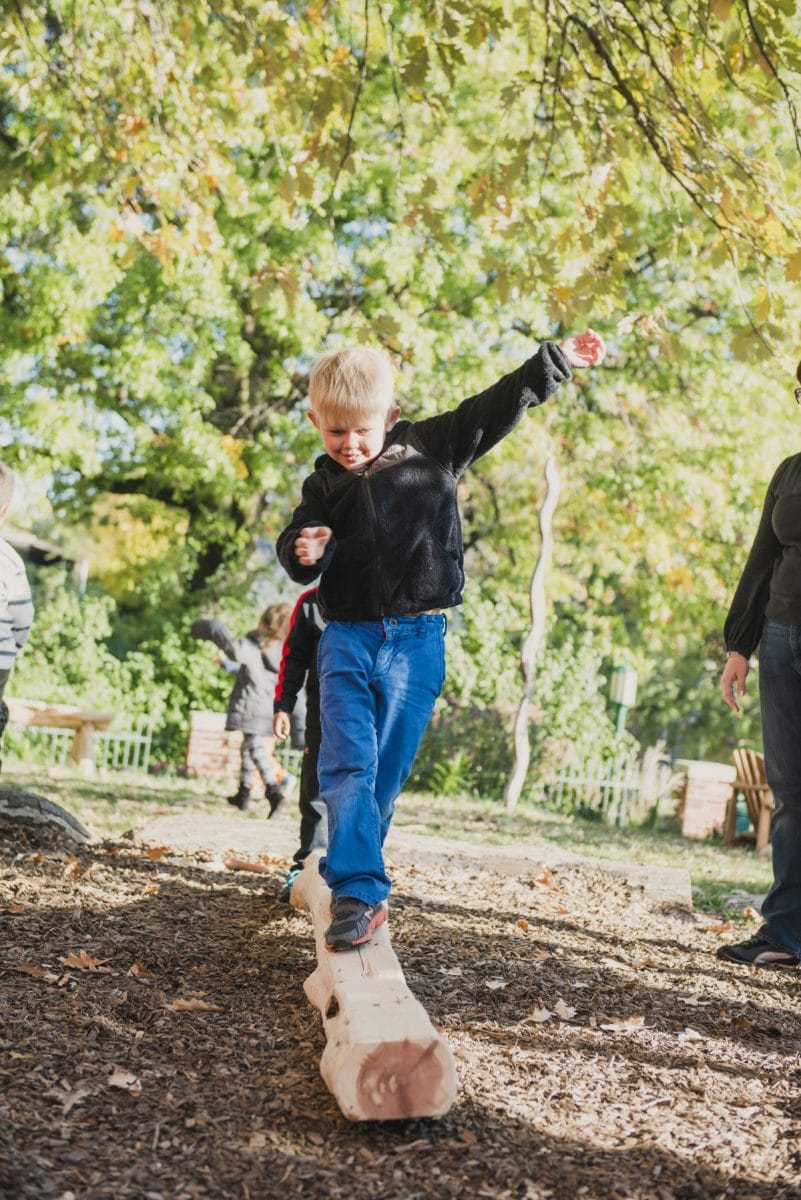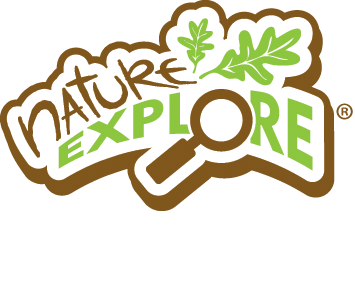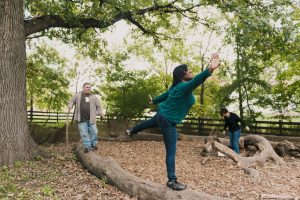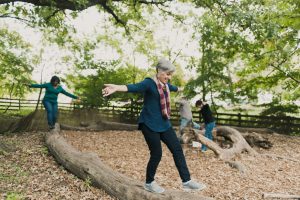Wisdom’s Symmetry

Nativity, once in the main of light,
Crawls to maturity, wherewith being crown’d,
Crooked eclipses ‘gainst his glory fight,
And Time that gave doth now his gift confound.
From Sonnet 60
William Shakespeare
Roy jumps from a small rock in his Nature Explore Classroom. Landing, his body thrusts forward. He shouts with joy as he rolls onto the soft green grass. He returns to the rock, rejoining the line of jumpers.
Nate jumps next, arms outstretched for balance. His knees flex as he lands. He recovers from the slight squat without falling, and calls out to his teacher. “Miss Hall, look what I can do.”
Roy jumps again and again. With practice, he will reach his goal of jumping without falling. He wants to develop skills that will also command recognition from his teacher and peers.
 Environments in the Nature Explore Classroom that support the development of body awareness and gross motor skills, the jumping off points from rocks, the gentle grade of the hill for running up and rolling down, the log for balance walking, the many textures and grades underfoot, far surpass in number and fascination those found indoors. Mankind has yet to improve on nature in providing the most effective environment for whole-child learning, and Nature Explore Classroom designs simply arrange nature into presentations that communicate intuitively to children.
Environments in the Nature Explore Classroom that support the development of body awareness and gross motor skills, the jumping off points from rocks, the gentle grade of the hill for running up and rolling down, the log for balance walking, the many textures and grades underfoot, far surpass in number and fascination those found indoors. Mankind has yet to improve on nature in providing the most effective environment for whole-child learning, and Nature Explore Classroom designs simply arrange nature into presentations that communicate intuitively to children.
The innate wisdom of the body, the voice that says “move, touch, smell, listen, observe, discover—all at once,” is often muted or silenced in children by adults who have long since forgotten the urgency of that voice within themselves. This wisdom is difficult to fully access indoors, which is where we adults increasingly live, and where we expect children to do most of their early learning.
All the child’s senses, and practice in gently challenging environments, are needed for achieving her potentials in motor skills, and much else. And this need for multisensory challenges does not end when she first walks through the door of school.
That many children with attention deficit disorders thrive while in Nature Explore Classrooms is just one example of the body’s wisdom finding expression. That these children often have difficulty focusing and “sitting still” in the indoor classroom is an example of the body’s wisdom denied.
We remember Mark, accident prone, and aggressive, living a legacy bequeathed him by his violent father—until he started playing in a Nature Explore Classroom. His body’s wisdom, finally unleashed, brought him to rocks for jumping and branches for swinging. Impulsivity diminished as Mark quickly mastered his body, as did his daily “accidents.” And he journeyed from hitting to helping. The body’s wisdom, when nurtured in an environment that gives strength to its voice, informs the whole child, as Mark’s did in saving him.
We adults no longer need to develop the foundational body awareness and motor skills that Roy works on through play and that helped heal Mark. Having lost the need for our bodies to communicate to us as Roy’s does to him, some of us might wonder why he chooses to jump over and over, seemingly without purpose. The young child’s body, through its innate wisdom, knows that awareness both of its position in space, and of the many factors involved in jumping, can only be learned and refined through repetitive practice. It knows that jumping is very important.
Soon Roy will learn to better use his arms for balance, just how far forward he can lean before jumping, and precisely how high to jump if he wants to land without falling. In a few years his throwing arm will learn to hurl a baseball with great accuracy. Roy’s innate body wisdom knows that through these forms of play, the motor skills he hones to precision will generalize throughout his physical life for years to come. But for now, this learning simply feels and looks like play.
In just a few short years, Roy’s motor skills will have refined to the point where repetitive play is no longer as important as it is now. Pure play will move to the background, as other forms of learning gain importance. Lessons replace play. Consciously goal-directed, repetitious movements will lead him into “playing” guitar. But this is not the free, instinctive play of his early childhood.
Adults who act “like children” are often labeled as “childish,” rather than as being “playful.” Our culture of adulthood allows few socially acceptable outlets for the play of our childhood. Those of us who can truly surrender to the child within us, and to the children with us, can find play if we follow their lead as they respond to their inner wisdom. Dance is another acceptable form of adult play.
The woman, living alone by choice at ninety-two, teetering slightly as she walks without assistance, has outlasted all but a few of her peers. She has a rich supply of younger friends.
Each morning she performs her stretching exercises before getting out of bed. As soon as her feet touch the floor, they carry her to the living room. She places a Tony Bennett CD into the player. As she looks out the glass doors, over her balcony, to the woods, stream, ducks and tall grasses six floors below, and to Boston in the distance, she dances.
She’s loved to dance all her life. During the war, when dance partners were scarce, she danced with boyfriends when they could get leave. Later, she danced with her husband, and with friends at parties. Her husband, the parties, and the dance partners are long since gone.
Now she dances alone.
Although she has travelled the world many times, she is still a small-town girl at heart. She grew up in a rural neighborhood, two doors down from a dairy farm. Her huge back yard bordered on forestland. Lifelong skills in sports were nurtured from having followed her body’s wisdom outdoors when playing as a young child. Her living room is now her outdoor classroom.
She is wise in many ways, but a certain wisdom lost to many of her lifetime friends was either never lost in her, or was rekindled over time. Motor skills once learned through those years of outdoor childhood play must now be practiced to prevent their unlearning.
The body’s wisdom speaks.
To Roy, it says, “Jump!”
Hers says, “Dance!”



